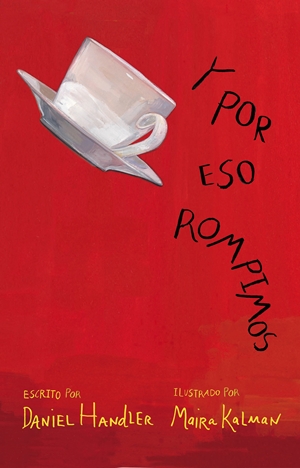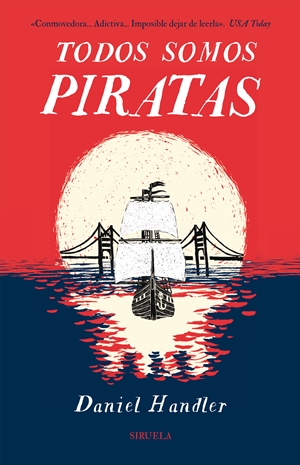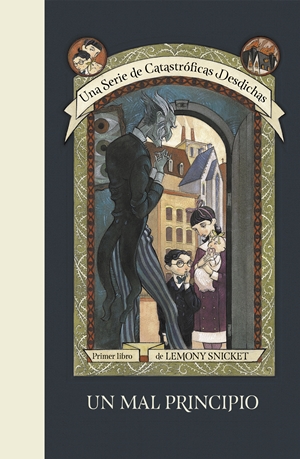¿Que te apetece leer?

Versión original
Daniel Handler
El Templo #57 (abril 2017)
Por Gabriela Portillo y Víctor Heranz
1.553 lecturas You are a very multi-faceted man: you have written for children, teens and adults. And, besides novels, you have written illustrated books, musicals, photo books, scripts... What do you think your books have to make them enjoyable by people of all ages and how do you think combining different arts can transform the experience of reading?
You are a very multi-faceted man: you have written for children, teens and adults. And, besides novels, you have written illustrated books, musicals, photo books, scripts... What do you think your books have to make them enjoyable by people of all ages and how do you think combining different arts can transform the experience of reading?
I don’t have a formula for making books that people enjoy - some of my books have a small audience and some of them have an enormous audience, which is how I like it, because the tapestry of literature is infinitely varied. I just like to make things. An idea occurs to me and I like to pursue it.
In Why we broke up Daniel Handler becomes Min, a 17-year-old girl with a broken heart. During its more than 300 pages, your voice fuses with hers in the lyrical letters she writes, telling the teenage drama of the first break-up. All of this accompanied by some beautiful illustrations. How did the epistolary style contribute to the story? Did the illustrations contribute to it too?
We began with the illustrations. Maira Kalman and I had done a picture book together in the usual way - I wrote a text and she illustrated it. We enjoyed working together, so I asked Maira what she wanted to paint, and I would come up with a story that went along with the illustrations. She wanted to paint ordinary objects, and I began to think of a story about romantic memory making such objects seem magical and luminous, and the book went from there.
 We are pirates is an explosion of genres which has a special narrator, a first person narrative who talks in the third person while sitting on a toilet. What was the origin of this story?
We are pirates is an explosion of genres which has a special narrator, a first person narrative who talks in the third person while sitting on a toilet. What was the origin of this story?
I was reading old pirate narratives, which often begin with a distant narrator framing the story for us. It makes the story safer, even when the story itself is dangerous and violent. We Are Pirates begins at a party, so we think that everything will turn out more or less all right.
Although it begins with humor and irony, We are pirates becomes dark and crude little by little. What led you to introduce those tough scenes in a book aimed at young adults?
I just wanted to be true to the story. Being a pirate can sound glamorous and exciting, but if you leave civilization, you become uncivilized.
An epistolary narrator, one who changes from first to third person, or Lemony Snicket in A series of unfortunate events. How do narrator and plot adapt to each other? What does each narrator contribute to each story?
I think the gaps created by an unreliable narrator--a gap between the reader and the narrator but also a gap between the narrator and the book--is one of the most delicious and particularly literary spaces.
 You participated as a editor in a compilation of the best non-required readings in 2014 (The Best American Nonrequired Reading 2014), in which young people chose their favorites new releases. What is your opinion about the mandatory readings? What surprised you the most about the teens' choices? Was there anything that surprised you in the teens choices?
You participated as a editor in a compilation of the best non-required readings in 2014 (The Best American Nonrequired Reading 2014), in which young people chose their favorites new releases. What is your opinion about the mandatory readings? What surprised you the most about the teens' choices? Was there anything that surprised you in the teens choices?
Everything surprised me. My co-editor and I would bring them all sorts of material--essays, stories, articles, interviews, comics, poems, diary entries--and we would never know what they liked. I’m in favor of mandatory reading. I wish someone would make me read some of the most difficult classics.
A series of unfortunate events has just been released on Netflix with Neal Patrick Harris as Count Olaf . You participated as executive producer and this has been your last work along with the novel We are pirates. What are you working on right now? Are we going to see more of your books adapted to the small or big screen?
I’m finishing work on the remaining two seasons of A Series of Unfortunate Events, and have two picture books and another novel coming out this year, at least in America. I seem to have devised for myself one of the busiest years of my life.
Finally, we would like to ask you to submit our questions to Lemony Snicket: How are you doing? Do you like working with Mr. Handler? And above all when will you stop asking the wrong questions?
Mr. Handler and I have an understanding, which is to continue working until we die. “Working” is a word which here means “asking the wrong questions, which is the essence of literature.











